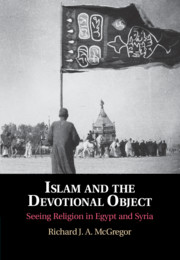Book contents
- Islam and the Devotional Object
- Islam and the Devotional Object
- Copyright page
- Contents
- Illustrations
- Preface
- Acknowledgments
- Note on Transliteration and Dates
- Introduction
- One Objects over Distance
- Two An Exuberant and Elusive Palanquin
- Three Processions, Banners, and the Religious Spectacle
- Four The Relic and Its Witness
- Five Religious Topography and the Relic
- Six Defacing and Displacing
- Epilogue
- Notes
- Bibliography
- Index
Introduction
Published online by Cambridge University Press: 16 June 2020
- Islam and the Devotional Object
- Islam and the Devotional Object
- Copyright page
- Contents
- Illustrations
- Preface
- Acknowledgments
- Note on Transliteration and Dates
- Introduction
- One Objects over Distance
- Two An Exuberant and Elusive Palanquin
- Three Processions, Banners, and the Religious Spectacle
- Four The Relic and Its Witness
- Five Religious Topography and the Relic
- Six Defacing and Displacing
- Epilogue
- Notes
- Bibliography
- Index
Summary
One stubborn issue in the study of religion is that of location. The question is where do you locate the meaning of the phenomenon you have chosen to explore? Puzzled by this question, you quite reasonably might wonder what your options are. Let me propose that you have two. Indeed, the entire history of the study of religion seems to have divided itself into two camps on this issue: one side holds that meaning is found “elsewhere,” removed from the context that produced the phenomena in the first place – while the other side insists that meaning remains anchored at the original site, and thus the place that holds a phenomenon up for us to consider is also its site of meaning. The first position I will simply call that of the reductionist, someone who deftly jumps the chasm separating the phenomena from the disciplined thinking that will supply distance, perspective, and ultimately meaning. The other, here perhaps awkwardly named the non-reductionist camp, insists on the uniqueness of each phenomenon, and distrusts relocation to an abstract, detached, and perhaps even obfuscating realm of meaning. So, reduction as I’m using it here isn’t an interpretation that lessens the significance of phenomena. On the contrary, we might say that reduction actually seeks to expand or fully unfold the relevance of data, reaching wider understanding thanks to extensive conceptual structures that stand apart from those particulars. In contrast, the non-reductive forgoes such gestures, confident that either an internal logic or a self-sustaining structure simply awaits the eye of a careful observer. The seesaw between these two positions, like any good game, is never resolved fully in favor of one player over the other. In fact, this whole debate is significant not because one side will overcome the other, but rather together their conflict is the stage upon which a greater struggle is being waged. It is a struggle with an anxiety about the entire study of religion, with each side representing the unease of the other. I will return to this below, but first let us turn our attention to one camp, that of reduction, and its side of this seesaw.
- Type
- Chapter
- Information
- Islam and the Devotional ObjectSeeing Religion in Egypt and Syria, pp. 1 - 17Publisher: Cambridge University PressPrint publication year: 2020



